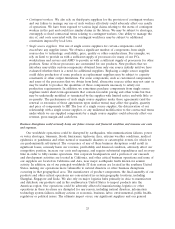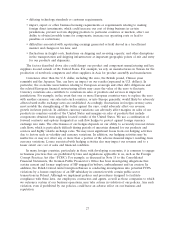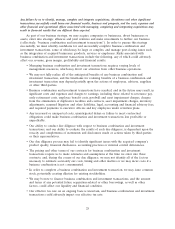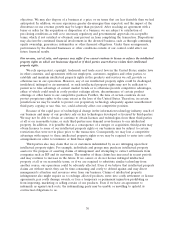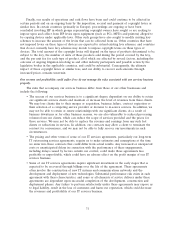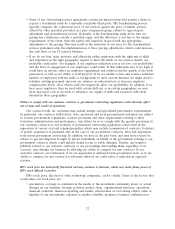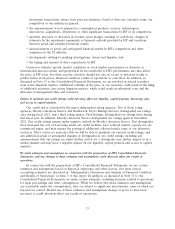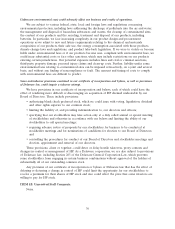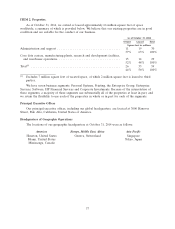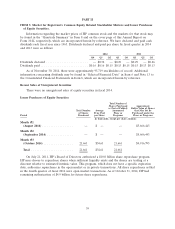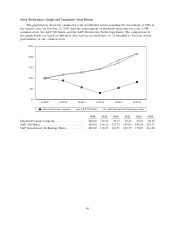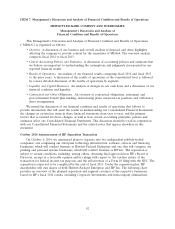HP 2014 Annual Report Download - page 42
Download and view the complete annual report
Please find page 42 of the 2014 HP annual report below. You can navigate through the pages in the report by either clicking on the pages listed below, or by using the keyword search tool below to find specific information within the annual report.Unanticipated changes in our tax provisions, the adoption of new tax legislation or exposure to additional tax
liabilities could affect our profitability.
We are subject to income and other taxes in the United States and numerous foreign jurisdictions.
Our tax liabilities are affected by the amounts we charge in intercompany transactions for inventory,
services, licenses, funding and other items. We are subject to ongoing tax audits in various jurisdictions.
Tax authorities may disagree with our intercompany charges, cross-jurisdictional transfer pricing or
other matters and assess additional taxes. We regularly assess the likely outcomes of these audits in
order to determine the appropriateness of our tax provision. However, there can be no assurance that
we will accurately predict the outcomes of these audits, and the amounts ultimately paid upon
resolution of audits could be materially different from the amounts previously included in our income
tax expense and therefore could have a material impact on our tax provision, net income and cash
flows. In addition, our effective tax rate in the future could be adversely affected by changes to our
operating structure, changes in the mix of earnings in countries with differing statutory tax rates,
changes in the valuation of deferred tax assets and liabilities, changes in tax laws and the discovery of
new information in the course of our tax return preparation process. In particular, the carrying value of
deferred tax assets, which are predominantly in the United States, is dependent on our ability to
generate future taxable income in the United States. In addition, there are proposals for tax legislation
that have been introduced or that are being considered that could have a significant adverse effect on
our tax rate, the carrying value of deferred tax assets, or our deferred tax liabilities. Any of these
changes could affect our profitability.
In order to be successful, we must attract, retain, train, motivate, develop and transition key employees, and
failure to do so could seriously harm us.
In order to be successful, we must attract, retain, train, motivate, develop and transition qualified
executives and other key employees, including those in managerial, technical, sales, marketing and IT
support positions. Identifying, developing internally or hiring externally, training and retaining qualified
executives, engineers, skilled solutions providers in the IT support business and qualified sales
representatives are critical to our future, and competition for experienced employees in the IT industry
can be intense. In order to attract and retain executives and other key employees in a competitive
marketplace, we must provide a competitive compensation package, including cash- and share-based
compensation. Our share-based incentive awards include stock options, restricted stock units and
performance-based restricted units, some of which contain conditions relating to HP’s stock price
performance and HP’s long-term financial performance that make the future value of those awards
uncertain. If the anticipated value of such share-based incentive awards does not materialize, if our
share-based compensation otherwise ceases to be viewed as a valuable benefit, if our total
compensation package is not viewed as being competitive, or if we do not obtain the shareholder
approval needed to continue granting share-based incentive awards in the amounts we believe are
necessary, our ability to attract, retain, and motivate executives and key employees could be weakened.
The failure to successfully hire executives and key employees or the loss of any executives and key
employees could have a significant impact on our operations. Further, changes in our management
team may be disruptive to our business, and any failure to successfully transition and assimilate key
new hires or promoted employees could adversely affect our business and results of operations.
System security risks, data protection breaches, cyber attacks and systems integration issues could disrupt our
internal operations or information technology services provided to customers, and any such disruption could
reduce our expected revenue, increase our expenses, damage our reputation and adversely affect our stock
price.
Experienced computer programmers and hackers may be able to penetrate our network security
and misappropriate or compromise our confidential information or that of third-parties, create system
disruptions or cause shutdowns. Computer programmers and hackers also may be able to develop and
34



